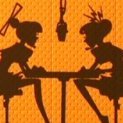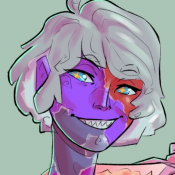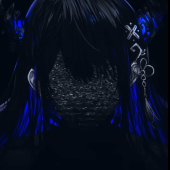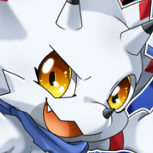Leaderboard
Popular Content
Showing most liked content on 06/14/2020 in all areas
-
1 likeThe group was suddenly running, trying to follow Cassius as it raced off to take them somewhere new and exciting. Milla had been taken by surprise but managed to run well enough to keep Nathan in view ahead of her, but also slow enough to keep Nomi in view behind her. The running was difficult on the less than athletic girl, but it seemed much less so than on Nomi who made it an effort to rarely exert herself. Eventually of course, Cassius made it to where it wanted to take the group and thus in a chain Nathan, Milla and then Nomi would all stop running and begin catching their breath. For her part, Milla had been rather amazed at the sights around her and tried to start taking things in even as her body demanded more oxygen. In the immediate area the most curious thing was a door with something resembling writing that the girl couldn't actually read. That was until the strange man wearing a mask came into view and began talking. He seemed to know Nomi but pondered who Milla and Nathan were. Somehow they were special, yet another thought to set Milla's mind racing. And then he seemed to almost read the bizarre writing in what sounded like common sense. A crack would naturally break a whole object if left unattended. Maybe it was a riddle. There were so many things to think about that she had to get information somewhere. No where better to start than with the people she already knew. "It could be the exciting thing we're looking for but um..." Milla started in response to Nomi who wondered if the door was the thing Cassius had wanted to show them. "Do you know this person Nomi?" Milla asked. "No... yes. Saw 'im once." Nomi offered. So the connection was tenuous at best. That left little options to figure out the strange set of circumstances past addressing the masked man himself. "Uh... excuse me sir, my name is Milla Reuter and we've never met as you seem to have guessed. Is there something special about this door?" the girl asked through her nerves. The man tapped his foot rapidly while looking at the door before turning to her. "Aren't all of them? This door doesn't exist anywhere else, correct?" He paused. "Does it?" "Well... naturally this exact door could only be here. And I can't say I've seen one quite like it or any writing like that before. Have you tried opening it yet?" Milla returned curiously. Her own thoughts began to run into various fantasies at the mans words as she pondered the door and a kingdom somewhere in the clouds where all doors could magically lead to if you knew the right words. The man though focused on her question as his eyes widened. Then he turned to the door and gave it a push. Turning back around he responded "Yes. Yes I have." "No luck there then..." Milla trailed off before getting to more actively thinking herself. "It seemed like you understand this strange writing. What is this language called? Have you seen it anywhere else around here?" The man stayed silent before answering this latest question. "I...don't know. Where have I seen it. I...It...." He winced, clutching his head, and shook it. Then his expression settled and he suddenly asked "Who are you?" At this line of questioning Milla became unsettled. The man had seemed eccentric before true, but now he seemed almost disturbed. She was worried about him and wanted to make sure he was okay but hesitated to approach him directly. "A-as I said, my name is Milla. Are you alright?" she asked. "No, half of me is left." He gave a short, harsh, laugh before muttering to himself a bit. Then focusing again on the girl, "you're here....for what?" "We..." Milla struggled to think at this point. She was very concerned about continued interaction with man who seemed more mentally unstable the longer they interacted. She backed up ever so slowly before turning to Nathan. "We were just looking for something new and exciting, right Nathan?" she asked, blatantly dropping the conversation off on the boy so she could avoid directly interacting with the maske man.
-
1 likeNew blog post is up for this week's episode of Revolutionary Girl Utena.
-
1 like←Previous Post -- Next Post→ Duel 12 -- For Friendship, Perhaps Or: Anthy Gets On Her Knees And Kisses Touga’s Sword Surely That’s Not A Metaphor For Anything Just a heads-up, this episode has a bunch of flashing lights in it that may affect people with certain kinds of photosensitivity. Previous episodes have had some, yes, but there’s a lot more in this one. Last week I mentioned auteur theory in something of a throwaway line, saying I’d probably cover it another time. Well, this is another time. This is still going to be a super basic overview, however, largely because, well, it’s still a seventy-year-old lens with which to look at media, and five-hundred or however many words this ends up being isn’t going to cover it all at once. Auteur is a French word, meaning “author,” and the theory seeks to answer a simple question: The creator of a book is its author, the painter of a landscape is its artist, but who is the creator of something that is inherently collaborative like a film? The answer, says the theory, is the director. It is always the director, and it is their job to exact their vision upon the world. Perhaps intuitively, this makes at least a little bit of sense, right? Even at the start of this series, I said Utena was “made by Kunhiiko Ikuhara”, for example, and there are countless filmmakers where one can say similar. The dichotomy of the time was the French New Wave, spearheaded by essays on the theory in Cahiers du Cinema magazine, against the Hollywood studio system. This isn’t to imply “great art” or at least “classics” weren’t made under the studio system, just that the zeitgeist has moved on since knowing who directed such work. Meanwhile, movies such as Cleo from 5 to 7 or The 400 Blows are almost inextricable from their directors, Agnes Varda and Francois Truffault respectively. One reason for this is how assigning a definitive creator immediately applies a sort of faux-insight into that person’s mind or at least a way to read into recurring themes in their works. Some modern examples one might go to include Lynne Ramsay dealing with themes of guilt and loss, Steven Spielberg and faulty familial (especially paternal) relationships, or Quentin Tarantino and revenge (and also the feet thing). Each is a clear theme in most if not all of their works, and it is because of auteur theory that we can draw a line through it all. That’s not to say that the theory is perfect. There is, of course, “death of the author,” a competing analytical trend that attempts to extricate a work itself entirely from who made it, be that a person or a studio. There’s also still a debate as to whether the director is even the sole creator of a work at all -- screenwriters like Taylor Sheridan and Charlie Kaufman can attest to that (though both have been directing more and more in recent years). And again, movie-making is still ultimately a collaborative process, and while actors and even some cinematographers get their dues, there’s still a whole lot that goes on behind the scenes that can sometimes be left out. So, how does Utena fit into all of this? Well, I already talked a bit about Chiho Saito and how her work leads into this particular series, but Ikuhara is the one people tend to credit (with the anime specifically, at least). When we look at the greater body of work Ikuhara has produced, there are some pretty traceable ideas, especially regarding gender roles and the brokenness of systems society otherwise runs on. It’s these two people, even out of the rest of Be-Papas, that seem to get the most credit for Utena’s creation. Maybe that’s the reason that, when they collaborated years later, they took the name with them. I rush to add, I’m not a film critic, merely an enthusiast at best, so I may have gotten things wrong or brushed over certain elements of history. But then again, I’m also not much of an anime critic, and yet, here I am. Let’s talk about some anime. Clothes are a pretty important aspect of Revolutionary Girl Utena. They’re symbolic of a broader sense of presentation, from how Nanami tries to keep up appearances to the and it’s here, for the first time, that Utena’s wardrobe changes. We’ve seen her in dresses before, but remember, even then she wore her decidedly tomboy school uniform underneath. Now, she has completely discarded it, even apathetically leaving it in disrepair as she deals with losing Anthy in the previous episode’s duel. Utena states it outright, she’s trying to be “normal.” To put it another way, she’s trying to be a “princess”. This is how Touga views her at least, too -- his boast about having finally saved his princess is a double meaning, referring both to Anthy and Utena in equal measure. After all, he did pretend to be her prince for several episodes. Even if he was truly after the Rose Bride alone (although, given past history and how he flirts with Utena in this episode, that’s not a given), to him, it wouldn’t do if he couldn’t “save” Utena as well. Princes save princesses, and Utena is a princess. Not that everyone is okay with that. Wakaba is certainly the standout of the episode, desperately trying to convince her friend that what is happening certainly isn’t normal (“You not being normal is normal!”) as well as giving as much as she takes in the slap department. Meanwhile, Juri steps in at the last moment to lend Utena her sword, a moment seemingly inspired by Touga’s comments about a storybook ending, though whether she desires Utena to be the prince of that ending or simply acting against miracles as is her (stated) wont, is a bit unclear. Even Anthy seems noticeably uncomfortable, becoming even more passive than she had been with Saionji at the start of the series. This is also the first time we get a clear view inside Anthy’s head, both in an imagine spot where she imagines Utena drinking tea with her, but also during the duel, where she commentates wondering why Utena isn’t giving up, culminating in a shocking realization and the afterimage of Utena’s prince. One can make the connection that this is her recognition of Utena as her prince coming to rescue her. Even that, though, is a connection that will have consequences. The episode, and thus, the Student Council arc, ends much like the series began, with Anthy approaching Utena as they exit the dueling grounds and introducing herself as the Rose Bride. But Utena wasn’t fighting for the Rose Bride, she was fighting, to subtly drop the episode’s title, for friendship, and she tells Anthy as much when she interrupts her asking if they can just go home. Anthy smiles, and they do. There’s still a lot to explore, and twenty-seven episodes to do it in, but it’s a happy ending for now, at least. Touga, meanwhile, is going to go sit in a chair and sulk for, like, a dozen episodes. -r Next Time: A recap episode! Except… ←Previous Post -- Link to Episode -- Next Post→
-
1 likePac-Guy 2: Part 2 - Pagoon - KAAAAAAAAAAN!!!!! Hello again! I'm back with another strange and obscure installment of Pac-Guy. Here we have the second part of the sequel, right after the suspenseful cliffhanger that was left on the last video. Again, hope you enjoy!




